
Mantidae is one of the largest families in the order of praying mantises, based on the type species Mantis religiosa; however, most genera are tropical or subtropical. Historically, this was the only family in the order, and many references still use the term "mantid" to refer to any mantis. Technically, however, "mantid" refers only to members of the family Mantidae, and not the 14 remaining families of mantises. Some of the most recent classifications have promoted a number of the mantid subfamilies to the rank of family, e.g. Iridopterygidae, Sibyllidae, Tarachodidae, Thespidae, and Toxoderidae, while other classifications have reduced the number of subfamilies without elevating to higher rank.
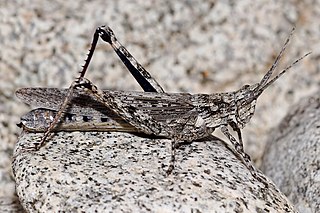
The Acrididae are the predominant family of grasshoppers, comprising some 10,000 of the 11,000 species of the entire suborder Caelifera. The Acrididae are best known because all locusts are of the Acrididae. The subfamily Oedipodinae is sometimes classified as a distinct family Oedipodidae in the superfamily Acridoidea. Acrididae grasshoppers are characterized by relatively short and stout antennae, and tympana on the side of the first abdominal segment.

Conocephalus is a genus of bush-crickets, known as coneheads. It was described by Carl Peter Thunberg in 1815.
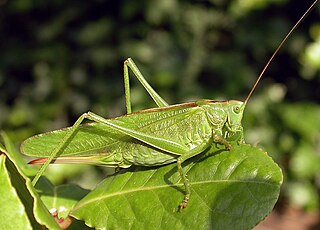
The Tettigoniinae are a subfamily of bush crickets or katydids, which contains hundreds of species in about twelve tribes.

Ameles is a wide-ranging genus of praying mantises represented in Africa, Asia, and Europe.

Amantis is a genus of praying mantids native to Asia and the islands of the Pacific Ocean and now belongs to the monotypic tribe Amantini of the subfamily Iridopteryginae.

Rhombodera is a genus of praying mantises native to Asia and possessing common names such as shield mantis, hood mantis, and leaf mantis because of their extended, leaf-like thoraxes.

The Phaneropterinae, the sickle-bearing bush crickets or leaf katydids, are a subfamily of insects within the family Tettigoniidae. Nearly 2,060 species in 85 genera throughout the world are known. They are also known as false katydids or round-headed katydids.

The Copiphorini are a tribe of bush crickets or katydids in the family Tettigoniidae. Previously considered a subfamily, they are now placed in the subfamily Conocephalinae. Like some other members of Conocephalinae, they are known as coneheads, grasshopper-like insects with an extended, cone-shaped projection on their heads that juts forward in front of the base of the antennae.

Conocephalinae, meaning "conical head", is an Orthopteran subfamily in the family Tettigoniidae.
Atlanticus is a genus of "eastern shieldback" bush crickets or katydids in the tribe Drymadusini. It has a discontinuous distribution in North America and temperate eastern Asia.

Pseudomops is a genus of cockroach in the family Ectobiidae. There are more than 40 described species in Pseudomops.
Xiphidiopsis is a genus of bush crickets in the subfamily Meconematinae. Species have been recorded from: India, China, Japan, Indochina, Malesia, and islands in the Indian Ocean and Pacific.
Nemotha is an Asian genus of praying mantids in the family Hymenopodidae: tribe Anaxarchini, containing a single described species, Nemotha metallica. The genus was previously placed in the Iridopterygidae, and two species have been placed in the revived genus Tricondylomimus.
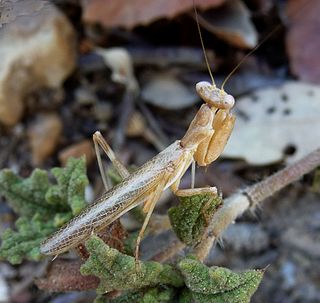
The mantis family Amelidae was previously placed in the family Mantidae. Species have been recorded from Africa, Asia, Europe and North America.
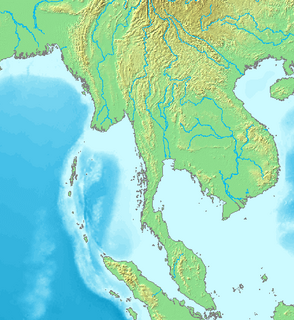
Paratoxodera is a genus of praying mantids in the family Toxoderidae and tribe Toxoderini; species are recorded from Indo-China and Malesia.

The Hierodulinae are a subfamily of praying mantids, originally used by Brunner von Wattenwyl. It was restored as part of a major revision of mantid taxonomy, and now contains genera previously placed elsewhere in the family Mantidae.
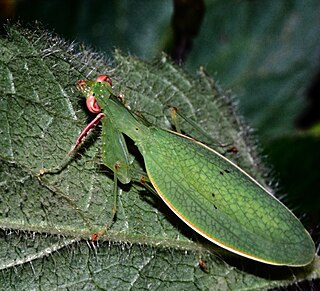
The Nanomantidae are a new (2019) family of praying mantises, based on the type genus Nanomantis. As part of a major revision of mantid taxonomy, genera and tribes have been moved here, substantially replacing the old family Iridopterygidae.

The Gonypetidae are a new (2019) family of praying mantids, based on the type genus Gonypeta. The first use of "Gonypetidae" was by Westwood and it has been revived as part of a major revision of mantid taxonomy; the subfamily Iridopteryginae having been moved here from the obsolete family Iridopterygidae. The Gonypetinae include Asian genera transferred from the obsolete taxa Amelinae and Liturgusidae.

The Leptomantellidae are a new (2019), small family of praying mantids, based on the type genus Leptomantella. As part of a major revision of mantid taxonomy, genera have been moved here from the Caliridinae in the now obsolete family Tarachodidae.

















